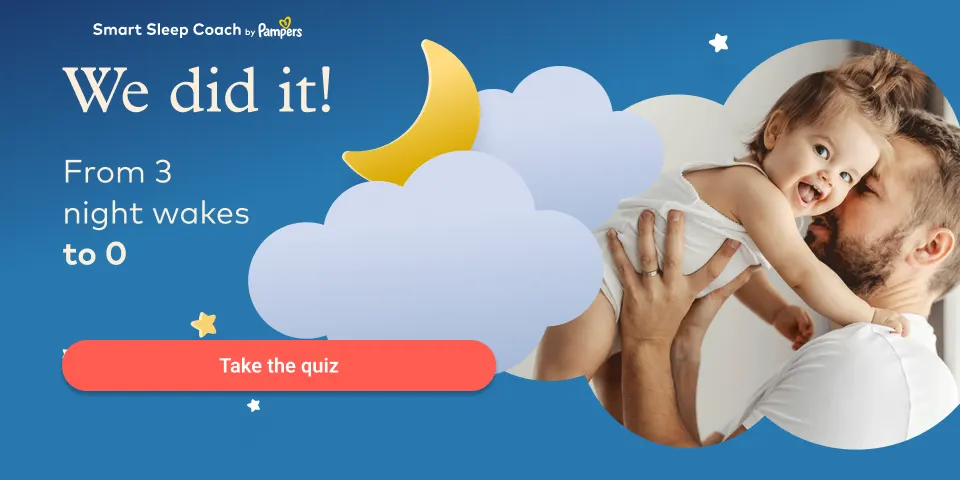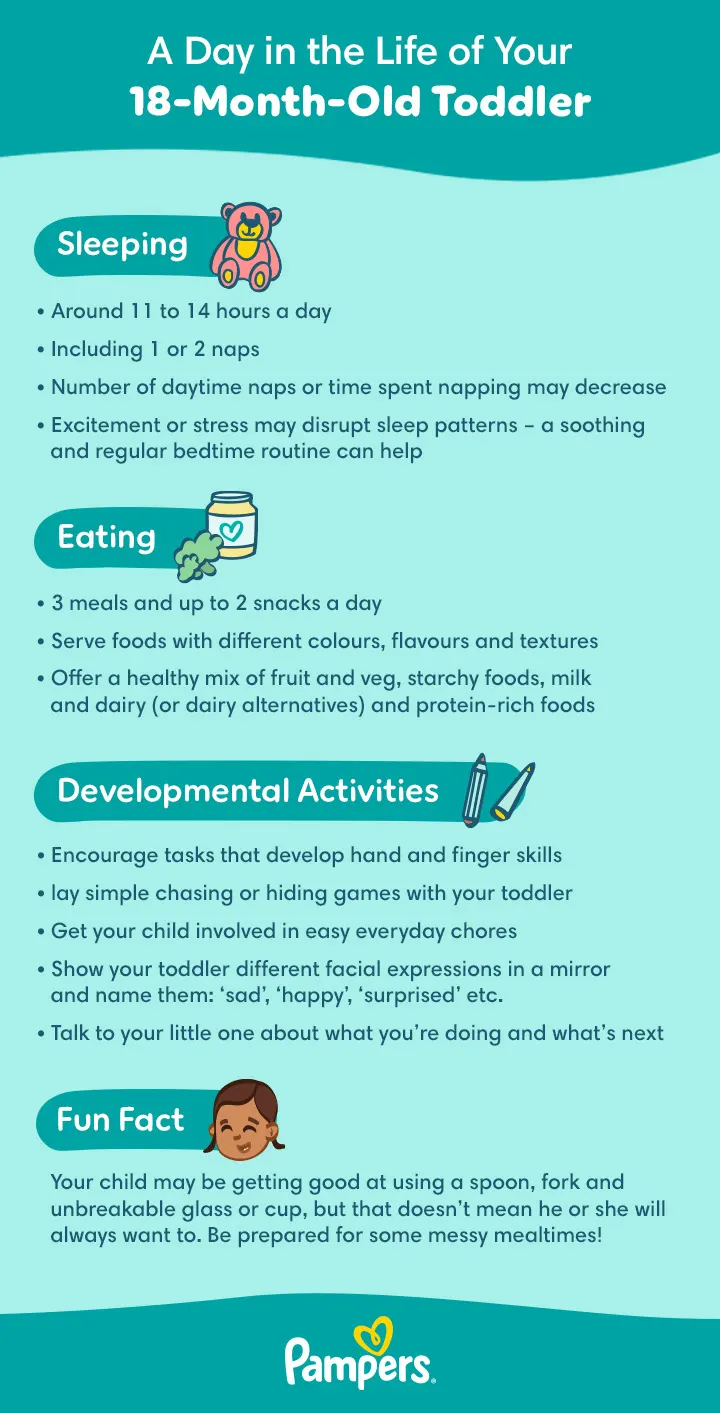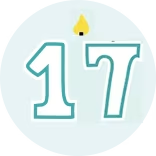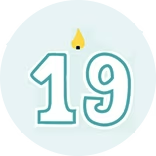18-Month-Old: Independent and Curious
Your 18-month-old may be growing more independent – and perhaps even a little strong-willed – almost by the day. Besides this, your toddler continues to develop important social, communication and motor skills.
Scroll down to find out more about the milestones your child could reach at around 18 months old, and what activities could help support your little one’s development.
Toddler Development Milestones
All children are unique individuals who develop at their own pace, and your 18-month-old is no exception. Don’t be disappointed or worried if your child reaches some of these milestones a little earlier or later than this month.
Social Development: Sharing the Fun
At around 18 months old, your toddler’s social skills are developing apace. One sign of this could be if your child seems keen to show you things that he or she is interested in, pointing to them and then back to you, so you can share in the fun too. Encourage and support this aspect of your 18-month-old’s social development by watching and commenting on things your toddler does.
Language Development: Copying Sounds and Singing Along
At 18 months old your toddler may try singing along to the songs and nursery rhymes that you’ve been enjoying together. Your child might also be able to copy common sounds of things like cars and animals – ‘beep beep’ or ‘baa’, for example.
If your child has already started to say a few words that you understand, he or she may get better at speaking over the weeks and months ahead. For example, one milestone that you might encounter at or around 18 months old is your toddler trying to put words together to make simple ‘sentences’, like ‘drink milk’ or ‘Mummy story’.
Hand and Finger Skills Development: Curious and Exploring
Your toddler’s fine motor skills are improving all the time, and your little one is probably using them to explore every nook and cranny of your home.
While it’s great to see your child getting better at useful and fun activities like handling a spoon and stacking blocks, there are some places you don’t want little fingers to get into – now’s a good time to check again that all your plug sockets are protected and other baby proofing measures are in place.
How to Support Your Toddler’s Development
Here are some activities to help support your 18-month-old’s development:
Encourage games that make use of hand and finger skills. Your toddler can probably do more and more activities that use fine motor skills (the ability to coordinate the small muscles in the hands, fingers and wrists in coordination with the eyes). Provide plenty of opportunities to do arts and crafts, which will allow him to express his creative side as well as boost his hand and finger skills. Especially good toys and games for an 18-month-old are those that involve holding something with one hand and doing something else with the other. For example, a music box that works by turning a small handle, or threading pasta onto a string.
Play with your toddler. Try simple games like follow-the-leader, chase or hide-and-seek. Your toddler probably won’t fully ‘get’ the rules, but that’s not important at this stage – in fact, you might end up inventing a new game that only the two of you understand. Just having fun and laughing with your 18-month-old toddler helps boost his or her emotional and cognitive development, and it’s a fantastic bonding experience for the both of you.
Involve your child in daily chores. Your toddler will probably enjoy helping you out with everyday tasks. Let your child be your little ‘helper’ by doing some simple tasks. If there’s something that you need to do yourself or isn’t safe for a toddler, you can just create a special task just for your child. For example, if you’re stirring hot soup, fill another pan with cold water and let your toddler sit at the table and stir that instead.
Show and teach the names of emotions. Stand or sit in front of a mirror and show your toddler happy, sad, surprised, shocked and silly faces, saying the names of the emotions – ‘now I’m happy’, ‘oh, what a sad face’ – as you do it.
Tell your toddler what’s going on. Your child will likely enjoy having a daily routine. Tell your little one what you’re doing and what will happen next, as well as recapping what you’ve just done. You can make it even more fun and engaging for your toddler by making up made-up songs about the things you’re doing together.
Mealtimes for Your 18-Month-Old
Your 18-month-old should be eating 3 meals and 1 or 2 healthy snacks a day on average, with a healthy mix of the main food groups.
Your toddler might not eat a perfectly balanced meal every time, and that’s OK – it’s normal for your child’s appetite and preferences to vary with time. Things are likely to average out over the week if you keep offering a variety of:
Fruit and vegetables. Packed with vitamins and minerals, as well as being a good source of fibre. A rule of thumb is to serve up five portions a day of fruit and veg. Try to include some with every meal and keep offering different colours, textures and flavours
Starchy foods. Pasta, potatoes, couscous, rice and other starchy foods are a source of energy, important nutrients and fibre.
Milk and dairy (or alternatives). At 18 months old your toddler still needs whole milk and full fat cheese, yoghurt and other dairy products. Skimmed or very low-fat milk doesn’t have the amount of fat or energy that your little one needs. Avoid giving your toddler dairy products made from unpasteurised milk, including mould-ripened soft cheese like camembert or brie and soft, blue-veined cheeses like Roquefort. If your child has a milk allergy or intolerance, or if your family follows a dairy-free diet, suitable milk alternatives include unsweetened, calcium-fortified soya, almond or oat drinks. Rice drinks shouldn’t be given to children under 5 years old as they may contain arsenic.
Protein. Fish, eggs, meat, beans and pulses are all good sources of protein and iron (another mineral that is essential for your toddler’s growth and development). Nuts are also packed with protein, but whole nuts can be a choking hazard so only give nuts as an ingredient in ground or chopped form or in smooth peanut butter.
Fruit Juice and Smoothies
Fruit juices and smoothies can contribute to your toddler’s recommended ‘five a day’ of fruit and vegetables, but you need to be careful because the sugar and acids they contain – even in unsweetened form – can be bad for little teeth.
This is why it’s a good idea to limit fruit juice, vegetable juice or smoothies to one cup (around 150 millilitres) a day, and to make sure your toddler only drinks them with food at mealtime, as this reduces the risk of tooth decay. Between meals, water is by far the best thirst-quencher for your child.
How Much Sleep Does a 18-Month-Old Need?
At 18 months old your little one could be sleeping anything from 11 to 14 hours in a 24-hour period, which could include 1 or even 2 naps during the day.
Sometime around 18 months old your toddler may start needing fewer daytime naps and/or the total amount of time spent napping decreases, but precisely when this happens can vary a lot from one child to the next. Generally, it’s likely that your child will keep needing a nap until around the age of 3 to 4 years old.
Keep in mind that your toddler’s sleep patterns can change any time as he or she grows. Periods of restlessness or sleep regression at around 18 months old can often be a response to environmental factors or possibly just the excitement of learning new skills and making new discoveries.
Keeping to a regular routine, getting up and going to bed at more or less the same time helps your toddler stay in tune with his or her natural body clock. Spending plenty of time outdoors or engaging in some of these fun indoor activities can also help work off surplus energy. In the evening, a soothing bedtime routine can help put your child in a sleepy frame of mind.
A Day in the Life of Your Toddler
Here’s a snapshot of how your toddler’s day might shape up at around 18 months old:
Your Toddler’s Health: In-Flight Safety
If you’re planning any international travel with your toddler, whether it’s a well-deserved holiday or a long-awaited trip to visit faraway relatives, here are some tips to take some of the turbulence out of flying with your 18-month-old:
Take some (sugar-free) snacks to chew on during the ascent and descent. The chewing action can help ease discomfort by relieving pressure in the ears. If your child still sucks his or her thumb or a dummy, this is another good way of helping with ‘popping ears’ around the time of take-off and landing.
Choose a seat for your child closer to the window. Being in an aisle seat could put your toddler at risk of being bumped into by the food or drinks trolley or other passengers. Being able to look out of the window could also be a great distraction for your 18-month-old.
It might be a good idea to change your toddler’s nappy before boarding the plane. The changing facilities onboard may be cramped, and any turbulence could make your job even harder once you’re airborne.
Make sure you have enough supplies in your nappy bag for the whole journey
Dress your child in easy-to-remove layers so it’s easy to adapt your toddler’s clothing to changes in the cabin temperature
Bring plenty of items to keep your child occupied, such as a favourite toy or blanket for comfort, as well as a good selection of toys, story books, colouring sheets and crayons
When planning your trip, if you’re hiring a car at your destination, check that a child seat suitable for your toddler’s age is supplied (if you aren’t taking your own).
If you’re travelling to a different time zone, it’s best not to make any plans for the first day after you arrive. Instead, use this time to let your child get used to the new mealtimes and other changes in your family’s routine.
FAQs at a Glance
Your toddler may reach some of these milestones earlier or later than other kids, but at 18 months old some things your child may be able to do include:
• Walking
• Running
• Kicking and throwing a ball
• Saying a few simple words
• Scribbling on paper or a blackboard with chalk or crayons.
Your Life as a Parent: Positive Parenting
At 18 months old your toddler is approaching the stage of development sometimes referred to as the ‘terrible twos’. The terrible twos aren’t always terrible and there will be plenty of magical moments too. However, from around 18 months old, as your child gains independence and starts to test boundaries, you may encounter challenging behaviour from time to time.
This might take the form of tantrums, including kicking, hitting or struggling when your toddler doesn’t want to do what you ask. Situations like can be frustrating or hard to deal with, but keep in mind that your toddler doesn’t yet know what’s right and wrong, and often the tantrums are caused by your child’s own frustration at not being able to express his or her needs in words yet.
Here are some strategies for dealing with challenging behaviour or tantrums:
Avoid smacking. It’s not always easy to keep calm in the face of a toddler’s tantrum, but smacking is known to be damaging in the long term. If you feel unable to cope, take a little time out to gather a little more patience.
Find out what’s caused the upset. In many cases, your toddler may just be hungry, bored or just in need of a hug. If you can identify the root cause, meeting the need – for example with a snack, a story or a cuddle – may be enough to put things right.
Explain. And explain and explain again... Your toddler doesn’t yet understand why some things aren’t allowed, so it’s important to explain – often time and time again – why you aren’t happy about a certain behaviour or why something isn’t allowed.
Praise good behaviour. Positive reinforcement is an excellent way of encouraging your little one to behave well from an early age. It helps to explain why you’re happy – for example, don’t just say ‘well done’, add a little detail: ‘you’re so good for helping me put away your toys’.
Set limits. Set reasonable boundaries and insist, gently but firmly, that they be respected. This is a time when your toddler is starting to test these limits, so it may seem like you have to keep repeating yourself – but keep at it. Once you’ve said no, don’t change your mind or your child will learn that tantrums work. Keep in mind not to set too many rules as your young child will find it impossible to remember and follow them.
Checklist for This Month
Make an appointment with the dentist. If you haven’t already done so, schedule your toddler’s next dental visit. It’s never too early to start taking your child for regular check-ups. Besides catching any problems with your little one’s teeth or gums at an early stage, your dentist can also give you useful advice on how to look after your child’s teeth. If you’re positive about going to the dentist, your toddler may also grow up worrying less about dental visits. Dental treatment provided by the NHS is free-of-charge for children.
Start a scrapbook. As your toddler does more arts and crafts activities, like drawing, finger-painting, or simply scribbling with crayons or coloured pencils, now could be a great time to start a scrapbook to save some of your little one’s artwork. He or she will love looking back on it in the years to come. Letting your toddler choose some of what to add to the scrapbook can also reduce any tears about the artwork that you bin.
To get more insights and information like this, sign up for regular emails:
18 month old baby - checklist





